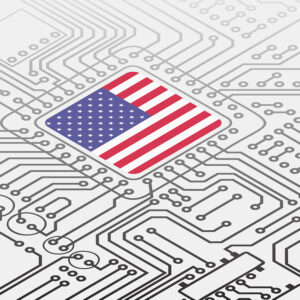China recently banned domestic sales of memory chips from the U.S. company Micron, claiming they pose cybersecurity risks. This was a lie, as anyone who follows the industry can attest.
The ruling Chinese Communist Party’s motivations for such acts of economic belligerence are seldom clear. Still, in this case, it could be payback for export controls the Trump administration imposed on memory maker Fujian Jinhua, a beneficiary of lavish government subsidies, in retaliation for previously stealing Micron technology. It also could be punishment for export controls the Biden administration imposed last year on semiconductor equipment.
China wants to suspend all sales of Micron’s chips partly to message U.S. companies about the consequences of complaining to the U.S. government about China’s mercantilist practices in strategically important industries. But more broadly, China’s long-term agenda is to dominate the global memory chip market, just as it previously did to dominate the global markets for solar panels, telecom equipment, high-speed rail and steel.
That is the critical distinction that risks getting lost in the shuffle: China’s actions are part of a coordinated campaign of mercantilist aggression to capture global leadership in advanced industries by stealing technology from rivals and propping up its state champions with massive subsidies, among other measures. America’s responses have been belated rearguard actions to minimize the damage to discrete targets. There is no moral or economic equivalence between the two.
The U.S. government can no longer allow this pattern of economic thuggery to stand. If it does, there will be no limits to further Chinese aggression. While the Biden administration is rightly talking with Beijing about the matter at hand, if negotiations are unsuccessful, then the U.S. government cannot just sulk; it must fight back because the only thing the Chinese government knows and respects is the retaliatory force that imposes pain.
If China doesn’t soon rescind its Micron ban, the United States should announce bans on select imports from Chinese technology companies into the United States. For example, China exported half a billion dollars’ worth of televisions to the United States last year. The United States could ban using Chinese tech platforms such as Alibaba in America.
Perhaps most striking about China’s outrageous ban on Micron is that China is portraying itself as the victim of the United States’ retaliatory measures — and many observers have fallen for this propaganda. But the reality is that the semiconductor export restrictions were justified because there was no way, given China’s military-civil fusion program, the United States could adequately ensure that these advanced technologies were not going to the Chinese military.
Here again, there is no moral or economic equivalence: The U.S. ban on semiconductor exports covered high-end chips with dual-use capabilities in military applications, whereas China’s Micron ban is an industrial policy tool designed to enable Chinese dominance of the global memory market.
This pattern cannot continue. China has been the economic aggressor at the expense of the United States and most of its advanced companies for at least two decades, and we have primarily taken it on the chin. Massive intellectual property theft has been met with pleas of “stop, don’t steal anymore.” Massive predatory subsidies of Chinese competitors have been with pleas of “stop, cut your subsidies.” Closing their markets to U.S. companies has been met with pleas of “stop, open your markets.”
Enough is enough. If China continues attacking America economically, the United States has to respond in kind, penalizing one or more Chinese industries until China relents.
At the same time, the U.S. government and other organizations, like think tanks and universities, need to do a much better job explaining to the world who is the real victim and the real aggressor. Too many people have fallen for the Chinese line that they are the victim and have forgotten the past 20 years of economic punches.
Some will say that the U.S. government should not escalate this conflict because it might spiral out of control. To be sure, that is a possibility. But consider the alternative: If the U.S. government does not respond in kind, it will provide a green light for China to continue ramping up its economic aggression and picking off one essential American firm at a time until we are where China wants us: an exporter of agricultural products, oil and tourism experiences.
Time for a policy of resolve: You hit us, we hit you.


